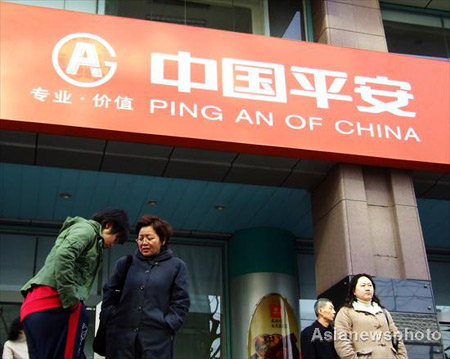Top Biz News
Ping An to lift bond holdings
(China Daily/Agencies)
Updated: 2010-01-14 07:57
 |
Large Medium Small |

Ping An Insurance (Group) Co will boost its holdings of bonds such as corporate debt this year as inflation drives up yields, Chen Dexian, deputy chief investment officer of China's second-largest insurer, said in an interview.
The Shenzhen-based company cut cash holdings to boost bonds in the second half of 2009, Chen, who manages about 560 billion yuan as chairman of Ping An Asset Management Co, said without giving details. Fixed-income investments fell to 74.7 percent as of June 30, down from 80.7 percent at the end of 2008, according to the company's 2009 half-year report.
"We were below our bond investment benchmark in 2009 and since the slowly climbing interest rates are good for us, we're now slowly getting neutral," Chen said in an interview in Shanghai. "If rates reach very high levels, we may go above the benchmark."
| ||||
Rising yields will help Ping An improve returns on its new debt holdings, Chen said. The spread between so-called guaranteed enterprise bonds and government debt may decline to between 100 and 120 basis points later this year from about 140 basis points now, which remains "very attractive", he said.
China's benchmark stock index still has room to rise, Chen said, after the Shanghai Composite Index surged 80 percent last year as a 4 trillion yuan stimulus package helped the world's third-largest economy recover from the global financial crisis.
"Our estimate is corporate profits will not be bad, and neither are valuation levels," Chen said. "But it will be difficult to see gains like last year's, and volatility in the stock index will increase."
Ping An's investment returns exceeded targets and were "relatively desirable" in 2009, he said without being specific.
Ping An boosted equities by 1.8 percentage points in the first half of 2009 to 9.6 percent as of June 30 as the market rallied. The ratio was "a little bit" higher at the end of last year, Chen said, adding any level between 10 percent and 15 percent is "normal".
Profits at listed companies may rise 25 percent this year, while valuations will be about 18.5 times earnings, Chen said. The executive said he favors financial, property and medical stocks for the medium to long term, or over the next two-to-three years.













